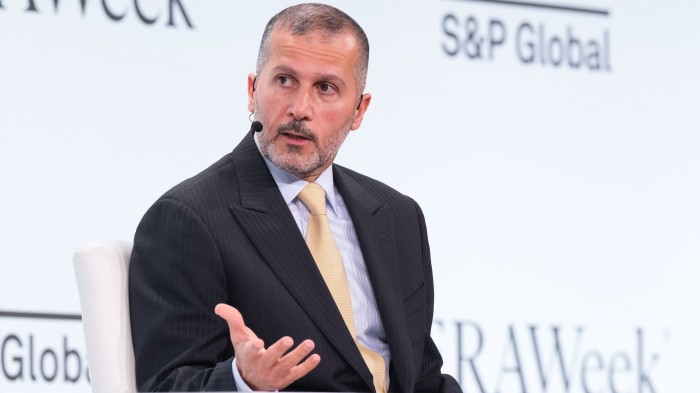Unlock the Editor’s Digest for free
Roula Khalaf, Editor of the FT, selects her favourite stories in this weekly newsletter.
The United Arab Emirates wants to build and consult on nuclear projects around the world, with the US as the fastest-growing market, the head of the country’s state-owned nuclear company has said.
Emirates Nuclear Energy Company has become a major player since it was established in 2009. It completed the four reactors of its Barakah nuclear power plant, the first in the Arab world, in under 12 years, and on budget. The project was developed in partnership with Korea Electric Power Corp.
The company, known as Enec, has built up investment and research and development teams to explore opportunities beyond the UAE, chief executive Mohamed Al Hammadi told the Financial Times. AI is set to drive a surge in demand for electricity to power data centres.
“We are interested in all markets, very very interested,” Al Hammadi said. “We want to capitalise on our success and we are looking at what we can do: build in the UAE, outside the UAE, the whole market.”
Roughly a quarter of the UAE’s electricity is now generated from nuclear power and up to 60 per cent in the winter when demand for air conditioning drops, Al Hammadi said.
“Who has done what we did in the last 10 years?” said Al Hammadi, who also chairs the World Nuclear Association. “I will not compete with China or Korea, but if you look from here [the Middle East] to the west, we are the only ones.”
Enec has been in discussions to invest in the UK’s Sizewell C project but Al Hammadi declined to comment on whether the company would proceed, only saying that negotiations had “been going through different cycles in the last year”.
The UK has pushed back the final investment decision on Sizewell, which was expected last year, to after the next government spending review expected in the spring, while the estimated cost of the project has doubled from less than five years ago.
Al Hammadi suggested that the US is seeing the fastest growth in demand for nuclear power because of the boom in AI computing.
“There’s much faster growth in energy demand, with the US leading in AI, and I think we are at the tip of the iceberg,” he said. “All the available energy in the US has been consumed over the last 18 to 19 months, and that is why they are even going after brownfield sites to restart some old [nuclear] units.”
Asked if he wanted to build, own and operate nuclear power stations, invest in projects or be hired as a consultant, Al Hammadi said: “All of the above.” He said he was agnostic about whether Enec invests in reviving old reactors, large-scale projects or small modular reactors.
“We have the institutional knowledge, we know how to structure deals, how to stitch them together and become a qualified, smart owner and how to manage these very complex projects, deliver them on time and also on budget,” he said.
He also suggested the UAE could play a role in building nuclear power stations in the global south. This month the gulf state signed a $15bn agreement for renewable projects in the Philippines, which is also in talks with Enec over a potential nuclear power station.
“We are in an advanced stage of passing a regulatory framework for nuclear and that will help us carry out our plan to have nuclear power,” Raphael Lotilla, the Philippines’ energy minister, said in an interview in Abu Dhabi.
Read the full article here

